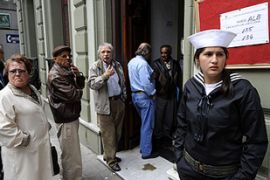Uruguay votes in presidential poll
Vote sees left-wing former guerrilla leader take on centre-right former president.

This time around, he wants to remove the income tax imposed by Tabare Vazquez, the outgoing president, and downsize the government.
Analysts have depicted Mujica, whose Tupamaro guerrillas organised political kidnappings and bank robberies in the 1960s, as more of a reformer than a revolutionary.
Political legitimacy
If Mujica triumphs, analysts say he will likely continue the policies of Vazquez, including plans to cut unemployment, strengthen minority rights and introduce laws allowing homosexuals to form civil unions and adopt children.
Vazquez is ending his five-year term on a wave of popularity but is constitutionally barred from re-election.
Mujica was convicted of killing a policeman in 1971 and endured torture and solitary confinement during nearly 15 years in prison.
In the quarter-century since he was freed, Mujica has helped transform the guerrillas into a legitimate political movement that is now the driving force within the ruling Broad Front coalition.
Mujica’s transition from revolutionary to political actor has found resonance with some voters.
“He’s more than a man. He’s a mirror of ourselves – his sacrifice, his love, his errors,” Alejandro Carbonell, a computer network installer, said.
Former revolutionary
But others are concerned by his reputation for being blunt and impolitic.
“He’s a man who simply can’t be president of Uruguay – he lacks presence. He can’t speak,” Walter Perez, who was handing out candidate lists on Sunday for the Colorado Party, said.
“If he travels abroad and talks like he does, they’re going to throw him out.”
The election winner will take office on March 1.
Alongside the presidential balloting, Uruguayans are voting on two plebiscites.
The first is a referendum on whether the country should drop an amnesty against military and police personnel accused of human rights abuses during Uruguay’s period of military rule between 1973-85.
A recent poll shows that 47 per cent of voters back the proposal, and 40 per cent are against.
Another referendum allow citizens living overseas to vote by mail.